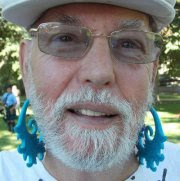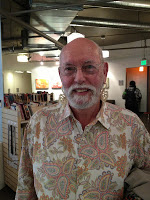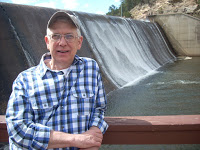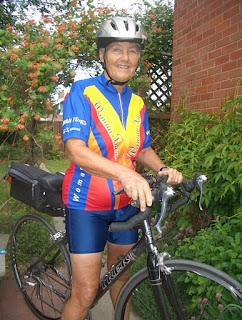For
several years I’ve been going to the GLBT Center for a program called
“Telling Your Story”. Each week we have a topic which runs the gamut
from “Weather” to “Queer, Just How Queer?” to “Mud”
to “Drama Queen” and so on. When I first started going to “Story
time,” the other name we call it, I would choke up and remember
experiences that I had so suppressed that I hadn’t thought about them for 60 or
so years. It seemed that once acknowledging the pain and denials of these old
happenings, I was relieved and another piece of my baggage seemed to have been
dealt with. The experience I’m writing about this time is a little different as
I am consciously telling about something for the purpose of sharing and also for
reflecting on or getting in touch with not only my feelings but also to share
these experiences with others that might want to know about the events of the
last few days.
The topic for July 16, 2012
is “The Interview.”
I
looked up the word “interview” in my little pocket dictionary and was
surprised that my concept of the word differed some from Merriam Webster’s: 1:
a formal consultation; 2: a meeting at which a writer or reporter obtains information
from a person; also the written account of such a meeting.
My
thoughts on the topic were more along the lines of a job interview or a TV
program technique, and I guess that does also apply within the dictionary’s
definition. If that’s the case then the
meeting Merlyn and I had on Thursday would or could be called an interview,
though at the time I didn’t know I would be writing an account of the
experience.
On
Wednesday I stopped by the office to pick up the rent receipts. Mable asked if
I had been to my apartment yet. I said “no” and she said that someone
from the victim assistance unit had been there and had left a note under my
door. I thought that someone had reported the injuries to my face and knee from
having had a bad fall after tripping on the raised sidewalk some 9 days
earlier. Perhaps they thought it was a gay bashing or mugging.
Entering
my apartment, I picked up the form that had been shoved under my door.
“City
and County of Denver, Department of Safety. July 11, 2012. 1:30PM I am very
sorry to have to bring you this news. There has been an emergency and I was
unable to contact you in person. Therefore, you have been requested to contact (then
written on a blank line) Lindsay–Boulder coroner’s office–at (the number) who
has more information concerning this situation.” It went on to state that
they would give me assistance and who to contact in their office.
I
immediately knew what had happened. I was sure that a homeless man I had known
years before had died. His name was Michael and has been one of the people I
most love. It was near impossible to relate to Michael, but the place in my
heart though full of love also has had a very big hole.
I
called Lindsey, got a recording to call another number and finally got her on
the phone. I gave her my name and she confirmed that it was Michael who had
died and that I was the only name on his emergency contact from some paperwork
the police had access to. Lindsay is Kayla Wallace’s assistant. Kayla is the
lead investigating officer.
Michael
had died in his sleep at The Boulder Shelter for the Homeless. I called there
and left a message (standard operating
procedure) I also found out that the case manager for Michael at the
shelter was Karyn. I called her and she said that the body had been found that
morning in his bunk when he didn’t wake up.
Merlyn,
my companion and I talked a lot about Michael and my experiences with him years
earlier. A few weeks ago Merlyn had helped me do a search for Michael thru an
agency we found on the internet. It gave his previous addresses. I recognized
some of them from years and years ago. One was in Boulder and we planned to
check it out sometime even though I thought that it too was an old address.
I
have thought much about Michael over the years and wondered what he was doing
and how he was. I have gone over and over in my mind what I could do or could
have done. Long ago I realized that he preferred the homeless lifestyle, but I
could never grasp why that would be his choice. He knew how to work the system, and he had been very good at it when I knew him. But the last time either
anyone in his family or I had seen him was 15 or so years ago. He liked Boulder
and I assumed that that was where he probably was. His brother-in-law had seen
him a couple of times, but there was never a further contact.
Merlyn
suggested we go to see the shelter and maybe find out if anyone knew him and
could fill us in on his life since I last saw him. Thursday morning I called
Karyn and made arrangements to meet her and see the bunk where Michael died.
By
this time I was already fatigued. I had
spent most of Wednesday afternoon and evening talking to Michael’s sisters and brother-in-law, and finally his brother called me from Albuquerque while Merlyn
and I were at Taco Bell. Merlyn had wanted to take me out to dinner and even
though I wasn’t very hungry I needed to take a walk. My knee was stiff and
sore. I was spacey from the pain pills and exhausted from all the phone calls
as well as the emotions of the day. I don’t hear well, so when I got a call on
Merlyn’s cell phone I didn’t have any idea who I was talking to. I had only
known that Michael’s brother had been named Jonathan so I didn’t connect when
the caller said it was Jon. Finally he explained that he was Michael’s brother.
I had now talked to two of Michael’s sisters and his brother-in-law several
times and now his brother. Michael’s
mother is in the hospital with a brain tumor which causes her to be erratic and
hallucinative.
Jon
certainly has his hands full. He seems to be a really nice person. He asked if
I would send him some of Michael’s ashes. He will wait until his mother can
accept the news. Surgery is scheduled for the 25th and one of the sisters is
planning to be there also.
So
Merlyn drove me to Boulder and we met with Karyn. This is what I will call the
interview; finding out what the life and last days of a homeless man was like.
What has happened in the last 15 years?
I
think it was a UPS guy at the door with Karyn when we arrived. He left and she
warmly greeted us and took us to her office. Even though she had only been
Michael’s case manager for a few months she had know him for some time. She had
been fond of him. Her description was of a quiet, but friendly and quite
independent, pleasant loaner. His history was a pattern of using the shelter,
getting into a housing program, breaking the rules by letting others crash at
his place, then losing his housing and repeating the cycle. He maintained close
contact with mental health and between all the agencies he successfully had
food, clothing, shelter and money for cigarettes. He knew and was known by his
community of choice. Karyn said he was very dark. I think probably from the sun
as he was fair and had been a blond when he was younger. She was surprised to
find out that he was only 47; apparently he looked much older. I would have
thought his hair would have been gray, but she said there was very little gray.
She figured he was part Native American from his looks and mentioned that it
was as if he was a hippy from the 60s. Michael had told people that he was in
fact a Native American, a veteran who had suffered injuries in the war and
numerous other scenarios that weren’t true.
Tim,
another case worker, knocked on the door. After introductions, explained that
he had known Mike, as they all called him, for 12 years. The interview confirmed that Michael was for
the last 15 or so years duplicating the patterns that had been my experience
years before when I helped him find housing, get food and checked regularly to
see how he was doing.
Karyn
showed us the bunk Michael was sleeping in when he died.
There
were so many things for me to process. I think that was true for Merlyn as
well. My worst fears over the years had been dispelled. He wasn’t found in some
dark alley. He hadn’t been mugged or beaten. He apparently wasn’t on drugs,
other than prescription drugs. He wasn’t in a filthy, rundown shelter. Quite
the opposite. He had spent a total of 1100 nights over the last 10 years at the
shelter, almost a third of the time. It is a newish, modern and spacious
building, very clean and well appointed. The group areas are warm and
comfortable and the outdoor recreation and sitting space is very nice; quite
comfortable. The shelter opens in the evening and is empty during the day. The
men and women have a bus that takes them downtown, but it is only one way. Many
can be seen on the streets. They are checked for alcohol when returning. The
rules are strict, but humane and they are treated with dignity and respect.
Karyn
shared that Michael had a sense of humor, that several days ago she had
observed Michael sitting outside in the recreation area as another homeless man
was shooting baskets all by himself. When finished, the basketball guy was
heading back to the building and as he passed Michael, Michael asked him ”
Who won?”
Now
for my observations and reflections. Michael was in a very nice shelter,
perhaps nicer than the best youth hostel that I ever stayed in. It reminded me
of the one in Amsterdam. He was in the Transition Unit, which means that by the
end of August he would have been in permanent housing. He was on an up cycle.
Both
his older sister and Merlyn have encouraged me to write about why Michael may
have chosen being homeless as a lifestyle. He didn’t have to be alone. There
were other people around and he could relate to them as he chose or he could be
by himself. He didn’t have to clean up his living space, a kitchen, bathroom,
bedroom, do the laundry or maintain and protect possessions. When he needed
clean clothing, there were places to pick up what he needed. There are places
to get food and places to shower and sleep. No one expected him to “make
something of himself”. He didn’t have to work or compete for position,
take orders, follow a schedule, maintain equipment or appliances, be indebted
to banks, credit card companies, or make payments on a car, a mortgage, a
student loan or be responsible for hospital and doctor bills. He could observe
the world go by and feel free, detached and could participate in conversation
and some activities with others as he wanted to. He was not responsible for
children, a wife, girlfriend, lover or anyone except himself, and then only to
be in some program or another that provided his needs when and as he wanted. I
think that once he was in permanent housing he would soon get lonesome, miss
the street companions and before long be living in filth and squalor, let
others crash there and loose that privilege again as has happened in the past.
The shelters for the homeless and living on the streets gave him the
fulfillment of his physical and emotional needs, companionship and a security
without responsibility.
Since
his snoring was very loud and erratic he may have had sleep asthenia, quit
breathing. The autopsy will take 6 to 8 weeks.
The
body was transferred to Crist Mortuary and sometime, probably this week, will
be cremated.
My
interview concerned a 47 year old man that I had known in the past and that
lived most of his life in and out of homeless shelters. It seems he had a good
soul. Though his family wasn’t capable of sharing their lives with him and vise
versa. He was loved. Though interactions had been difficult, he was always
loving.
I
feel that I can report to his brother and 3 sisters that he lived a life that
he chose and did it on his own terms. He had the respect of those who live that
lifestyle and those who provide services. He was apparently well liked. He
achieved his goals. He had mastered the skills necessary for life on the
streets.
I
have a sense of closure and feel privileged to have known and loved Michael. My
deep love comes in part from the fact that I was his father.
About the Author

I go by the drag name, Queen
Anne Tique. My real name is Michael King. I am a gay activist who finally came
out of the closet at age 70. I live with my lover, Merlyn, in downtown Denver,
Colorado. I was married twice, have 3 daughters, 4 grandchildren and a great
grandson. Besides volunteering at the GLBT Center and doing the SAGE
activities,” Telling your Story,” “Men’s Coffee,” and the
“Open Art Studio.” I am active in Prime Timers and Front Rangers. I
now get to do many of the activities that I had hoped to do when I retired;
traveling, writing, painting, doing sculpture, cooking and drag.





